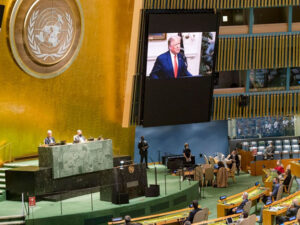
Civil Society, Education, Featured, Headlines, Health, Human Rights, Indigenous Rights, Latin America & the Caribbean, TerraViva United Nations
–
CIVICUS discusses threats to the security, rights and ancestral lands of Brazil’s quilombola communities with Wellington Gabriel de Jesus dos Santos, leader and activist of the Pitanga dos Palmares Quilombola community in Bahia state.
Founded by formerly enslaved Africans, quilombola communities represent a legacy of resilience and freedom. But their way of life is increasingly disrupted by harmful infrastructure projects and their members face constant threats from land grabbers and speculators. Community leaders demanding justice and reparations are met with intimidation and violence while public institutions look the other way. The National Coordination of Rural Black Quilombola Communities urges the Brazilian government to grant them protection and ensure accountability.

Wellington Gabriel de Jesus dos Santos
What are quilombola communities, and what’s the focus of their struggle?
Quilombola communities were born out of resistance to slavery. My community, Quilombo Pitanga, was founded by the descendants of those who fought for freedom when slavery was officially abolished in 1888. Even after slavery ended, the struggles continued because former slave owners and landowners continued to exploit and persecute our people.
Today, quilombola communities continue to fight for our land and culture. It’s important to us to preserve our heritage for future generations because it’s a testament to the strength of our ancestors, our survival and our resilience.
We advocate for justice and land rights through a combination of local and international strategies. We work with organisations such as the National Articulation of Quilombola Communities, which brings together quilombo leaders from across Brazil. We also hold protests, develop public awareness campaigns and work with international organisations to draw attention to our struggles.
What threats does your community face and who’s responsible?
My community faces significant threats, particularly from drug traffickers and powerful business interests. These threats became very real when my great-grandmother, María Bernadete Pacífico, was murdered by drug traffickers last year. She fought for the preservation of our culture and the wellbeing of younger generations, and I believe that’s what got her killed. She was part of a human rights protection programme, but the promised protection failed when she needed it most. My father was also murdered in 2017, during a battle against the construction of a landfill near our territory.
After my great-grandmother was killed, I haven’t been able to visit my family or enter the community. I live in constant fear, watching over the community and its heritage from afar.
Our community also faces institutional racism, reflected in the fact that the state built a prison on our land but fails to provide basic services such as schools and hospitals. We lack any public security, as a result of which some believe they can act with impunity. The prison, which was inaugurated in 2007, was supposed to be a shoe factory that would bring prosperity to the community. Suddenly, it was announced that it would be a prison, and it brought rising criminality and contamination of water resources and wetlands. Quilombo Pitanga dos Palmares hasn’t been the same since.
The bigger problem is that many quilombola communities, including ours, own valuable land. My community has a large territory, so we’ve been targeted by powerful interests that view our land as prime real estate for expansion. In 2012 we fought against the construction of an industrial road that would have cut through our land. There were large corporations involved, which made this fight particularly hard.
How do authorities respond?
The state not only turns a blind eye, leaving us vulnerable to exploitation, but it’s also complicit in these attacks because it protects the interests of big business rather than people. INEMA, the agency responsible for granting environmental licences to companies, has been investigated for corruption that has led to the approval of projects that harm communities like ours.
The authorities say they care about our safety, but the reality is different. The laws that are supposed to protect us are ignored and often the government is either unconcerned or in collusion with those causing harm.
What support do quilombola communities need?
Several issues need immediate attention, including securing our land rights, gaining access to basic services such as health and education and preserving our cultural heritage. A practical issue that needs attention is the toll we are forced to pay to enter the city, which constitutes arbitrary discrimination and isolates us from the wider community.
We are fighting the prison built on our land and the expansion of harmful companies that threaten our environment. We need more than words; we need tangible action, including stronger laws to protect us.
We need international support because local and national authorities often ignore or dismiss our struggles. Financial support is crucial, particularly for community leaders under threat. Many of us, including myself, face death threats. Our lives are far from normal and we need resources to ensure the safety of our families and communities.
United Nations human rights agencies could play a vital role in protecting our rights and securing the support we need. Unfortunately, despite local efforts to raise awareness, we often feel isolated in our struggles.
GET IN TOUCH
Instagram
SEE ALSO
Brazil: a step forward for Indigenous peoples’ rights CIVICUS Lens 20.Oct.2023
Brazil back on the green track CIVICUS Lens 21.Jul.2023
Brazil: ‘If Bolsonaro continues as president, it is a threat to the Amazon and therefore to humanity’ Interview with Daniela Silva 21.Sep.2022










